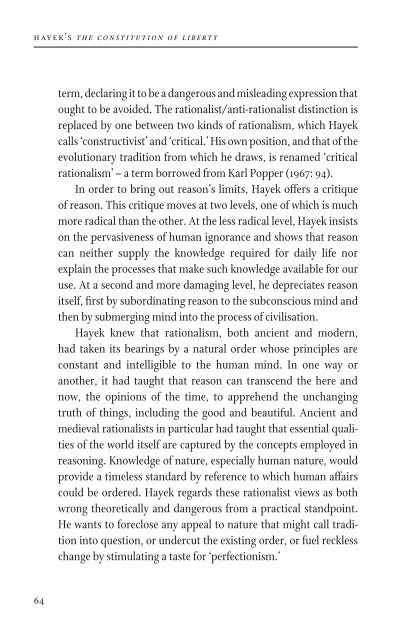Hayek's The Constitution of Liberty - Institute of Economic Affairs
Hayek's The Constitution of Liberty - Institute of Economic Affairs
Hayek's The Constitution of Liberty - Institute of Economic Affairs
You also want an ePaper? Increase the reach of your titles
YUMPU automatically turns print PDFs into web optimized ePapers that Google loves.
h ay e k ’ s t h e c o n s t i t u t i o n o f l i b e r t y<br />
t h e u s e a n d l i m i t s o f k n o w l e d g e<br />
term, declaring it to be a dangerous and misleading expression that<br />
ought to be avoided. <strong>The</strong> rationalist/anti-rationalist distinction is<br />
replaced by one between two kinds <strong>of</strong> rationalism, which Hayek<br />
calls ‘constructivist’ and ‘critical.’ His own position, and that <strong>of</strong> the<br />
evolutionary tradition from which he draws, is renamed ‘critical<br />
rationalism’ – a term borrowed from Karl Popper (1967: 94).<br />
In order to bring out reason’s limits, Hayek <strong>of</strong>fers a critique<br />
<strong>of</strong> reason. This critique moves at two levels, one <strong>of</strong> which is much<br />
more radical than the other. At the less radical level, Hayek insists<br />
on the pervasiveness <strong>of</strong> human ignorance and shows that reason<br />
can neither supply the knowledge required for daily life nor<br />
explain the processes that make such knowledge available for our<br />
use. At a second and more damaging level, he depreciates reason<br />
itself, first by subordinating reason to the subconscious mind and<br />
then by submerging mind into the process <strong>of</strong> civilisation.<br />
Hayek knew that rationalism, both ancient and modern,<br />
had taken its bearings by a natural order whose principles are<br />
constant and intelligible to the human mind. In one way or<br />
another, it had taught that reason can transcend the here and<br />
now, the opinions <strong>of</strong> the time, to apprehend the unchanging<br />
truth <strong>of</strong> things, including the good and beautiful. Ancient and<br />
medieval rationalists in particular had taught that essential qualities<br />
<strong>of</strong> the world itself are captured by the concepts employed in<br />
reasoning. Know ledge <strong>of</strong> nature, especially human nature, would<br />
provide a timeless standard by reference to which human affairs<br />
could be ordered. Hayek regards these rationalist views as both<br />
wrong theoretically and dangerous from a practical standpoint.<br />
He wants to foreclose any appeal to nature that might call tradition<br />
into question, or undercut the existing order, or fuel reckless<br />
change by stimulating a taste for ‘perfectionism.’<br />
Hayek aims to discredit rationalist theories <strong>of</strong> this sort<br />
through his evolutionary account <strong>of</strong> mind. By his account, the<br />
human mind evolved slowly for a million years or more before<br />
reason finally emerged. Even now, our actions depend much more<br />
on habit and unthinking responses to signs than on the kind <strong>of</strong><br />
knowledge that an individual mind ‘consciously manipulates’<br />
(24). Man’s mind is thus ‘a product <strong>of</strong> the civilization in which<br />
he has grown up and … he is unaware <strong>of</strong> much <strong>of</strong> the experience<br />
which has shaped it – experience that assists it by being embodied<br />
in the habits, conventions, language, and moral beliefs which are<br />
part <strong>of</strong> its makeup’ (24). What mind has and will become depend<br />
on the process <strong>of</strong> civilisation. Civilisation preserves and transmits<br />
general rules and beliefs, and the individual mind is a collection<br />
<strong>of</strong> them. This is not to say that the mind is merely passive. Besides<br />
classifying sense data, it has ‘the capacity to restrain instincts.’<br />
Without such restraints, civilisation could never develop (1988:<br />
22; cf. 1979: 160).<br />
Hayek was greatly influenced by the historicisation <strong>of</strong> the<br />
mind that occurred in German thought in the late nineteenth<br />
century – a development that would, over the next century,<br />
transform the way scholars understood human knowing and<br />
reasoning. This was a time when historians and anthropologists<br />
were able to argue, from abundant data, that beliefs and worldviews<br />
vary greatly from one society or civilisation to another. Such<br />
data alone was insufficient, however, to support the claim that the<br />
mind itself changes. For this a theory <strong>of</strong> knowledge was required.<br />
This new theory began from Kant’s principle that ultimate<br />
being is unknowable to reason, because we perceive it only as<br />
filtered through the mind’s categories. Nature, as known to us,<br />
is already a product <strong>of</strong> a mental transformation and not a true<br />
64<br />
65












